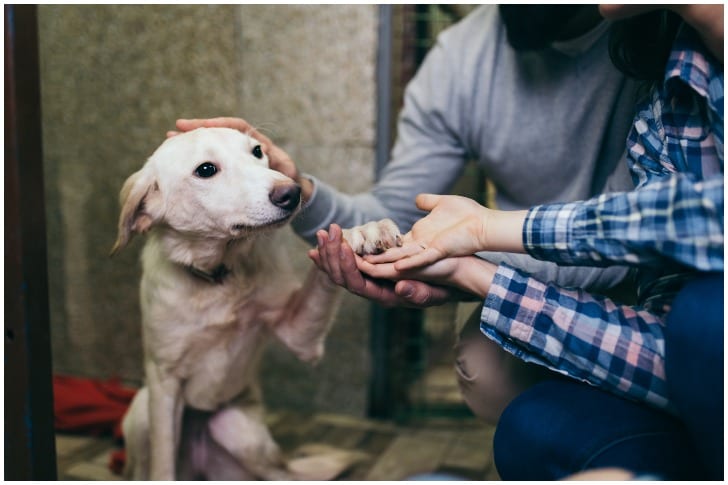
Furry Friends For The Elderly

Some say a dog is a man’s best friend – and no one would agree more than an elderly person! For many, growing old also means growing lonely or isolated. When their children leave their nests to pursue their own career and family lives, many senior citizens struggle with adjusting to a missing presence. Research has found that the best antidote comes in the form of a furry companion. Pets have shown to be incredible in terms of providing emotional support and companionship to the lonely. However, there are several considerations to make before you make a beeline for the pet store:
1. Which Pet Are You Getting?

hedgehog94/Shutterstock: Choose a pet according to your lifestyle and convenience
Not every pet is the same, and animals have different characteristics that are better suited to some lifestyles than others.
Dogs, for example, can be a lot of work. While they are extremely loving creatures who can provide plentiful entertainment, they also require a significant amount of exercise, grooming, and attention. Most dogs require daily walks, and hence, may not be suitable pets for an elderly person with mobility issues. Dogs are ideal pets for seniors who lead active lifestyles and are able to devote time and energy to dote on their furry companion. Puppies also tend to be more energetic than older dogs, and also are more likely to develop health conditions like allergic reactions and infections.
On the other hand, taking care of a cat requires significantly less effort. Cats are fairly independent creatures – they are capable of self-grooming and are happy to wander around by themselves. When supplied with nutritious food and a litterbox, they make ideal companions for elderly people who want to take it easy. Cats are great for snuggling and cuddling with, and contrary to the popular belief, are very affectionate with their owners in their own unique ways.
Another potential pet to consider – birds. When provided with food, water, and occasional cage-cleaning, birds can be pretty much self-sufficient. Songbirds like the canary whistle beautiful tunes and others like the parrot can be trained to fly around the living room and repeat phrases. If you are prepared for the occasional untimely squawk, these make for fairly low-maintenance pets.
Ultimately, while we can draw generalizations about different types of pets, each animal is a unique creature whose traits may not perfectly fit the profiles described. Hence, it is important to interact with a potential pet and understand its character before purchase.
2. How Much Will It Cost?

Steidi/Shutterstock: Plan on the expenses before buying a pet
Sadly, responsible pet ownership costs a pretty penny. Costs can rack up right from the start – some pet shops or shelters charge for adoption, and this is followed by veterinary bills for neutering or spaying. In the long term, you can expect to make routine payments for food, toys, and visits to the veterinarian. Additionally, unexpected ailments can also drive up medical bills for your pet.
To give a ballpark of what it will cost you, The American Pet Products Association estimates that dog owners rack up almost $300 a year in veterinary bills alone, while the figure is around $200 for cat owners. Providing a basic, nutritious diet for either costs around $300.
When considering rare breeds of pets, it is important to note that the owner may face specialized medical costs if their pet falls sick. It may also be harder to access treatment for these pets.
3. Are There Viable Alternatives?

Budimir Jevtic/Shutterstock: Consider multiple alternatives before bringing a pet home
After careful consideration, you may sometimes conclude that pet ownership is not suited to the senior citizen you have in mind. Do not worry, for there are other ways for them to enjoy the benefits of interacting with animals without committing to owning one. For example, many animal shelters run programs where volunteers groom and play with the pets.
Moreover, pet therapy is becoming increasingly popular and could be a service offered in the elderly person’s care facility. Some pet therapy services even do home visits. Furthermore, a friendly neighbor could also be more than happy for their pet to spend some occasional quality time with the senior.
One thing to bear in mind before gifting a senior citizen a pet is that pets should most definitely not be surprises! A pet is a lot of responsibility to thrust onto someone without considering the costs and effort involved for the person. Instead, discuss the possibility with the elderly person and then explore your options. If possible, opt out of blowing big bucks on niche breeds in pet shops. Instead, head to your local shelter to find a furry friend who would benefit from the adoption as much as the owner.
More in Lifestyle
-
`
Challenges Business Owners Fear the Most – And How to Overcome Them
It goes without saying that every entrepreneur encounters hurdles that test their resolve and push their limits. Yet, some of these challenges...
October 23, 2024 -
`
What Major Medicare Changes You Should Expect in 2025?
Medicare Advantage Plans with Part D May Raise Costs Starting in 2025, some Medicare Advantage Plans that include Part D prescription...
October 16, 2024 -
`
Top 5 Best Places for Skiing Around the World
When it comes to adventure and winter sports, finding the best places for skiing can take your vacation to the next...
October 10, 2024 -
`
A-List Celebrities at Milan Fashion Week Spring 2025
The excitement of Milan Fashion Week Spring 2025 is palpable as the fashion elite gather to celebrate creativity and style in...
October 1, 2024 -
`
Polish Government to Rise Minimum Wage By 8% in 2025
The Polish government’s minimum wage is set to increase by 8% in 2025. While workers and unions welcome the move, many...
September 25, 2024 -
`
Kidney Infection: Causes, Symptoms, Prevention & Treatment
Kidney infections – AKA pyelonephritis – are serious health conditions that can lead to severe discomfort. But does kidney infection cause...
September 19, 2024 -
`
What to Do in Ubud, Bali – Top Attractions & Activities
Ubud, the cultural heart of Bali, offers an array of activities that capture the essence of this enchanting island. From exploring...
September 11, 2024 -
`
Important Aspects of Your Health You Should Pay Attention To
When thinking about your health, it’s crucial to consider the key factors that create a solid foundation for your well-being. These...
September 6, 2024 -
`
6 Creative Birthday Party Ideas For Adults
Gone are the days when birthdays were just about cakes and candles. Now, it is all about creating memorable experiences that...
August 28, 2024















You must be logged in to post a comment Login